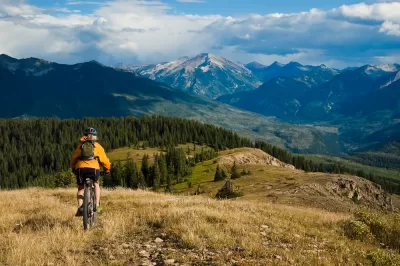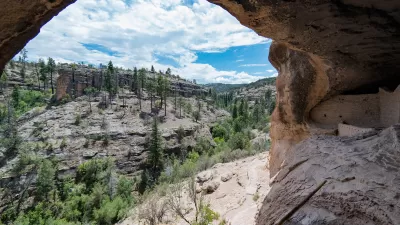Environmental groups are split over legislation that would remove the nationwide ban on bicycles in the wild.

A proposal, from national nonprofit Sustainable Trails Coalition, would allow other federal agencies to decide whether to apply language in the U.S. Wilderness Act banning "mechanical transport" to bikes on a case-by-case basis.
Since bikes are currently banned on 106 million acres of federal wilderness land in the United States, that flexibility could make a big dent.
Local conservation groups in Oregon have opposed the proposal—some for reasons more philosophical than ecological. In an article by Jamie Hale for The Oregonian, activists say they're protecting a perceived ethos of nature; one spokesperson cites values of "humility" and "restraint," claiming that bikes don't "belong" in nature.
A more pragmatic approach comes up in the comments, where locals argue that the velocity and volume of mountain bikes amplifies their impact on trails.
But if a philosophy of the wilderness remains at issue, it’s worth noting that an attitude that sees only organic access to nature as legitimate can also impact people who use strollers, wheelchairs, and other tools that, while allowed on trails, still face barriers to accommodation there.
Congress has not yet acted on the proposal. If it were to pass, agencies would determine how to approach the issue, and could impose their own restrictions on bikes.
FULL STORY: Do mountain bikes belong in the wild? Battle brewing over bike access to federal land

Maui's Vacation Rental Debate Turns Ugly
Verbal attacks, misinformation campaigns and fistfights plague a high-stakes debate to convert thousands of vacation rentals into long-term housing.

Planetizen Federal Action Tracker
A weekly monitor of how Trump’s orders and actions are impacting planners and planning in America.

San Francisco Suspends Traffic Calming Amidst Record Deaths
Citing “a challenging fiscal landscape,” the city will cease the program on the heels of 42 traffic deaths, including 24 pedestrians.

Defunct Pittsburgh Power Plant to Become Residential Tower
A decommissioned steam heat plant will be redeveloped into almost 100 affordable housing units.

Trump Prompts Restructuring of Transportation Research Board in “Unprecedented Overreach”
The TRB has eliminated more than half of its committees including those focused on climate, equity, and cities.

Amtrak Rolls Out New Orleans to Alabama “Mardi Gras” Train
The new service will operate morning and evening departures between Mobile and New Orleans.
Urban Design for Planners 1: Software Tools
This six-course series explores essential urban design concepts using open source software and equips planners with the tools they need to participate fully in the urban design process.
Planning for Universal Design
Learn the tools for implementing Universal Design in planning regulations.
Heyer Gruel & Associates PA
JM Goldson LLC
Custer County Colorado
City of Camden Redevelopment Agency
City of Astoria
Transportation Research & Education Center (TREC) at Portland State University
Jefferson Parish Government
Camden Redevelopment Agency
City of Claremont




























